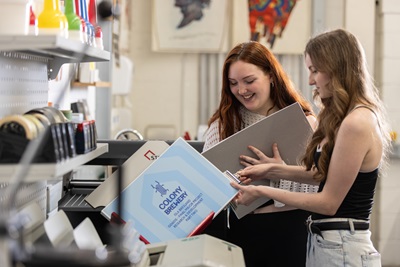-
Study
-
Quick Links
- Open Days & Events
- Real-World Learning
- Unlock Your Potential
- Tuition Fees, Funding & Scholarships
- Real World Learning
-
Undergraduate
- Application Guides
- UCAS Exhibitions
- Extended Degrees
- School & College Outreach
- Information for Parents
-
Postgraduate
- Application Guide
- Postgraduate Research Degrees
- Flexible Learning
- Change Direction
- Register your Interest
-
Student Life
- Students' Union
- The Hub - Student Blog
- Accommodation
- Northumbria Sport
- Support for Students
-
Learning Experience
- Real-World Learning
- Research-enriched learning
- Graduate Futures
- The Business Clinic
- Study Abroad
-
-
International
International
Northumbria’s global footprint touches every continent across the world, through our global partnerships across 17 institutions in 10 countries, to our 277,000 strong alumni community and 150 recruitment partners – we prepare our students for the challenges of tomorrow. Discover more about how to join Northumbria’s global family or our partnerships.
View our Global Footprint-
Quick Links
- Course Search
- Undergraduate Study
- Postgraduate Study
- Information for Parents
- London Campus
- Northumbria Pathway
- Cost of Living
- Sign up for Information
-
International Students
- Information for International Students
- Northumbria and your Country
- International Events
- Application Guide
- Entry Requirements and Education Country Agents
- Global Offices and Regional Teams
- English Requirements
- English Language Centre
- International student support
- Cost of Living
-
International Fees and Funding
- International Undergraduate Fees
- International Undergraduate Funding
- International Masters Fees
- International Masters Funding
- International Postgraduate Research Fees
- International Postgraduate Research Funding
- Useful Financial Information
-
International Partners
- Agent and Representatives Network
- Global Partnerships
- Global Community
-
International Mobility
- Study Abroad
- Information for Incoming Exchange Students
-
-
Business
Business
The world is changing faster than ever before. The future is there to be won by organisations who find ways to turn today's possibilities into tomorrows competitive edge. In a connected world, collaboration can be the key to success.
More on our Business Services-
Business Quick Links
- Contact Us
- Business Events
- Research and Consultancy
- Education and Training
- Workforce Development Courses
- Join our mailing list
-
Education and Training
- Higher and Degree Apprenticeships
- Continuing Professional Development
- Apprenticeship Fees & Funding
- Apprenticeship FAQs
- How to Develop an Apprentice
- Apprenticeship Vacancies
- Enquire Now
-
Research and Consultancy
- Space
- Energy
- AI Futures
- CHASE: Centre for Health and Social Equity
- NESST
-
-
Research
Research
Northumbria is a research-rich, business-focused, professional university with a global reputation for academic quality. We conduct ground-breaking research that is responsive to the science & technology, health & well being, economic and social and arts & cultural needs for the communities
Discover more about our Research-
Quick Links
- Research Peaks of Excellence
- Academic Departments
- Research Staff
- Postgraduate Research Studentships
- Research Events
-
Research at Northumbria
- Interdisciplinary Research Themes
- Research Impact
- REF
- Partners and Collaborators
-
Support for Researchers
- Research and Innovation Services Staff
- Researcher Development and Training
- Ethics, Integrity, and Trusted Research
- University Library
- Vice Chancellors Fellows
-
Research Degrees
- Postgraduate Research Overview
- Doctoral Training Partnerships and Centres
- Academic Departments
-
Research Culture
- Research Culture
- Research Culture Action Plan
- Concordats and Commitments
-
-
About Us
-
About Northumbria
- Our Strategy
- Our Staff
- Our Schools
- Place and Partnerships
- Leadership & Governance
- University Services
- Northumbria History
- Contact us
- Online Shop
-
-
Alumni
Alumni
Northumbria University is renowned for the calibre of its business-ready graduates. Our alumni network has over 253,000 graduates based in 178 countries worldwide in a range of sectors, our alumni are making a real impact on the world.
Our Alumni - Work For Us
The 10 Most In-Demand Skills for Graduates in 2025
8 min read
Back to Experiential Learning hub
Whether you’re about to start uni or are nearing graduation, you’ll be eyeing a graduate career with strong earning potential and a bright future.
To secure that, you’ll need a combination of academic knowledge and professional skills that employers look for in new hires.
But what are they? How do you get them? And how can different experiences at university help?
LinkedIn, the world's largest professional network, has identified the 10 most in-demand employability skills for 2025*.
Here’s what they are and how you can develop them at uni through experiential learning (it just means ‘learning by doing’ and there are loads of opportunities at Northumbria University).
1. Relationship building
What is relationship building? And why is it important?
Coming in at number one is relationship building, and that’s no surprise. Unless your dream future involves moving to a mountain top and taking a vow of silence, every career requires relationship building.
Whether you’re training to be an engineer, nurse, solicitor, marketer, or any other exciting career, you need to be able to work effectively with people to get the job done.
How can you develop relationship-building skills at university?
You can develop relationship-building skills at university by working with a diverse range of people: from your coursemates and tutors, to industry contacts and members of the community.
For example, many Northumbria University programmes include live projects with real businesses.
This involves working as a team to understand the challenge, coming up with solutions, and pitching your ideas to the business. All of which helps you develop strong relationship-building skills, as well as communication, problem-solving, and more.
2. Strategic thinking
What is strategic thinking? And why is it important?
Strategic thinking is about making smart decisions that drive success. Like spotting opportunities, identifying risks, and working out how to get ahead of the competition. It requires the ability to think about complex situations and come up with solutions that work.
How can you develop strategic thinking at university?
One way to develop strategic thinking skills at university is to get involved in real-world problem-solving experiences.
For example, at Northumbria University, the Business Clinic consultancy module gives students on some courses the chance to act as a consultant to a local or national organisation. By assessing their issues and suggesting solutions, students sharpen their strategic thinking, and businesses benefit from new perspectives.
Depending on your choice of degree, look for similar opportunities to engage with real-world challenges.

3. Artificial Intelligence (AI) literacy
What is AI literacy? And why is it important?
AI literacy is increasingly important for employability. Experts estimate Artificial Intelligence could create 97 million jobs in 2025, and impact millions more. So it makes sense that employers want AI-savvy graduates in their team.
AI is evolving all the time, so you can’t know everything. But showing you’re familiar with the applications and uses of AI will make you an asset to any employer.
How can you develop AI literacy at university?
To develop AI literacy at university, look for opportunities to use AI appropriately to enhance your learning. Your tutor will be able to guide you on this.
For example, a law student might use AI to simulate a legal debate and test their reasoning skills, a computing student could use it to identify errors in their code, or an engineer could use it to identify trends in data and improve designs.
4. Communication skills
What are communication skills? And why are they important?
Communication is the ability to convey information clearly and effectively, whether through verbal, written, or digital media. In the workplace, communication is key, whether you’re speaking in a meeting, presenting information in a report, or collaborating with colleagues from another team.
How can you develop communication skills at university?
Just like relationship-building skills (above), you can craft your communication skills at university by meeting and communicating with a diverse range of people. You can do this simply by throwing yourself into university life, engaging fully in seminars, and joining student societies.
But you can also supercharge your communication skills through experiential learning too. For example, fieldwork and lab projects teach you to communicate clearly and accurately with team members. While work experience opportunities, such as placements or internships, are another great opportunity to practice professional comms skills.
Be sure to check out opportunities for volunteering and studying abroad too.
5. Large Language Model (LLM) experience
What is LLM experience? And why is it important?
Large Language Models are a type of AI that can understand and create human-like conversations and text. If you’ve used ChatGPT or similar, you’ve used an LLM. LLMs are changing the way we work. They help people write emails, summarise research, create content, code, and lots more.
How can you develop LLM experience at university?
You might have already developed these skills informally by using AI tools to support your learning. If not, look for opportunities to use LLMs ethically in your studies.
For example, clarifying difficult concepts, generating practice questions to test your knowledge, or structure your notes and highlight key themes. It’s important to use these tools thoughtfully to support your learning and help you work more effectively – not to do the work for you.

6. Conflict resolution
What is conflict resolution? And why is it important?
Conflict is a common issue in life and work, whether it’s arguing with your housemates over whose turn it is to wash up, or dealing with someone who won’t pull their weight in a group project. The world of work is no different. Disagreements and misunderstandings happen there too.
This is why conflict resolution is a core skill. To settle disagreements constructively at work, you’ll need empathy, negotiation, and problem-solving skills.
How can you develop conflict resolution skills at university?
The only way to develop conflict resolution skills is to experience conflict. Don’t worry, it’s not as bad as it sounds. You won’t be arguing, just discussing and debating different points of view, while discussing your personal take on topics.
There are lots of ways to engage in healthy conflict resolution at university. For example, our Law students can take part in the Student Law Office, where they provide free legal advice to members of the community, helping them resolve real-life problems.
Projects with industry are a great opportunity too – check out this article from Northumbria graduate Sam Shah, about conflict resolution in a real-life consultancy project.
7. Adaptability
What is adaptability? And why is it important?
Adaptability is about being able to deal positively with change. Nothing stands still in today’s world. Strategies update, technology evolves, projects end, new ones start, people come and people go. It’s really important that you can adapt to those changes and still succeed. It requires resilience and a positive attitude where you see change as an opportunity to learn and grow.
How can you develop adaptability at university?
At university, you can develop this through experiences that challenge and stretch you. For example, you might be working on a live client project, but the client doesn’t like your idea. This can be a positive experience because it gives you the chance to reflect, make changes, and come back stronger.
There are also opportunities like simulations, where you practise your skills in realistic professional settings created by your tutor – like the teaching experiences Ellie and Ryan talk about here. Simulations involve role playing different positions – such as a teacher or parent – to solve problems. They help you learn to think on your feet and adapt to changing situations, as well as develop communication and problem-solving skills.
Or how about studying abroad? That shows you’re adaptable by living, studying, and even working in another country. Over 200 Northumbria University students study abroad every year, from one semester to a full year.
8. Process optimisation
What is process optimisation? And why is it important?
It’s probably not what you dream of when you picture your future career. But process optimisation is relevant to almost any job. It’s about looking at how things currently work and making them better; whether that’s making them faster, cheaper, or improving quality.
How can you develop process optimisation skills at university?
University is full of opportunities to develop process optimisation skills, whatever you’re studying.
In STEM subjects, you may develop process optimisation skills through lab work and fieldwork, where you test and refine experiments. But you’ll also gain them in creative subjects and humanities too. Every time you act on feedback to improve a piece of art, performance, or written work, you have a chance to optimise your processes.
You might also get the chance to complete a design-based learning project. This is specifically concerned with designing something and then reflecting on how to make it better.
9. Innovative thinking
What is innovative thinking? And why is it important?
Innovative thinking is the ability to solve problems creatively and come up with new ideas. It’s really important to businesses because it can help them find better ways of doing things or develop new products.
It’s a mindset you can develop. It’s all about freeing yourself from standard ways of thinking, looking for problems to solve, and not being afraid to try new things.
How can you develop innovative thinking at university?
University is the perfect place to develop innovative thinking skills because you’re surrounded by innovators and thinkers.
At Northumbria, you may have the chance to get involved in research projects with academics who are at the cutting edge of their fields. You could be exploring new technologies, solving real-life problems, and uncovering fresh insights about the world. It’s an exciting place to be.

10. Public speaking
What is public speaking? And why is it important?
Speaking in public may make you shudder, but it’s a top skill in employment. Depending on your chosen degree and career, you might need to address clients at a consulting firm, pitch concepts to colleagues at a design agency, deliver research findings at a professional conference, and lots more.
It’s much better to start building this skill at university, with the support of your tutor and peers, than when you’re in your new job.
How can you develop public speaking skills at university?
You can find lots of public speaking opportunities at Northumbria University, from pitching to clients and delivering presentations, to taking part in simulations that require you to speak up in group challenges.
Some degrees also include opportunities to get on stage and really stretch your public speaking skills, like our Theatre and Performance course. Just take a deep breath, stay calm, and remember we’re all rooting for you to succeed!
Get career-ready with real-world experience
University is more than just lectures and exams, it’s about you preparing for the brightest of futures. When you’re researching where to study, choose somewhere that builds practical skill development into your degree, like Northumbria University.
We call it ‘experiential learning’ here, it just means learning by doing. Every year, we offer over 10,000 practice placements, and more than 7,000 students complete a live project or clinic module. Others gain hands-on experience through fieldwork, simulations, creative practice, and more.
Discover how Northumbria University gets you career-ready with practical experience.
Visit the Experiential Learning Hub.
* This article is based on LinkedIn’s Skills on the Rise 2025 research, which looks at their data to understand (1) which skills employers are looking for in job ads, (2) which skills their members are adding to their profiles, and (3) the most common skills in people recently hired through their platform.

